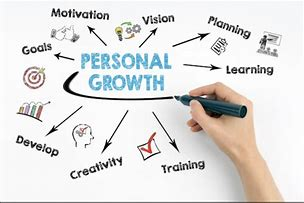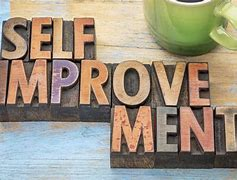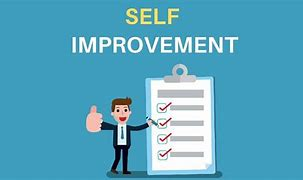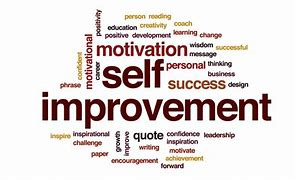Personal Growth
Personal growth refers to the ongoing process of
self-improvement, learning, and development that allows individuals to reach
their full potential in various areas of their lives. This can include areas
such as emotional, intellectual, spiritual, physical, and social growth.
Personal growth involves a conscious effort to acquire new
knowledge and skills, overcome obstacles, and develop a deeper understanding of
oneself and others. It requires a willingness to step outside one's comfort zone,
take risks, and make changes in one's thoughts, beliefs, and behaviors.
Some common strategies for personal growth include setting
goals, practicing self-reflection and mindfulness, seeking feedback and
guidance from others, engaging in new experiences and challenges, and pursuing
opportunities for education and personal development.
The benefits of personal growth can include increased
self-awareness, improved self-esteem and confidence, greater resilience and
adaptability, enhanced relationships, and a more fulfilling and meaningful
life.
Learning new skills or knowledge through formal education,
self-study, or training programs.
Practicing self-care and taking care of one's physical and
emotional well-being, such as by exercising regularly, getting enough sleep,
and seeking therapy or counseling when needed.
Developing new relationships and strengthening existing ones,
such as by joining clubs, volunteering, or participating in social events.
Engaging in creative pursuits, such as writing, painting, or
playing music, to express oneself and explore new ideas.
Seeking out new experiences and challenges, such as traveling
to new places, trying new foods, or pursuing new hobbies.
Working to overcome fears or limiting beliefs that may be
holding you back from achieving your goals.
Practicing self-reflection and mindfulness to gain a deeper
understanding of oneself and one's values, and to identify areas for growth and
improvement.
Personal growth is a continuous process that requires
commitment, self-awareness, and a willingness to learn and grow. By engaging in
intentional practices and seeking out new experiences, individuals can develop
their skills, deepen their understanding of themselves and others, and improve
their overall well-being.
Developing a growth mindset: A growth mindset involves
believing that your abilities and intelligence can be developed through hard
work and dedication. By adopting a growth mindset, you can cultivate a greater
sense of resilience, persistence, and motivation to achieve your goals.
Practicing gratitude: Practicing gratitude involves
intentionally focusing on the positive aspects of your life and expressing
appreciation for them. This can help cultivate a greater sense of happiness,
contentment, and well-being.
Embracing vulnerability: Embracing vulnerability involves
being open and honest with yourself and others about your thoughts, feelings,
and experiences. This can help deepen your connections with others and foster
greater intimacy and trust in your relationships.
Developing self-awareness: Developing self-awareness involves
gaining a deeper understanding of your own thoughts, feelings, and behaviors.
This can help you identify patterns of behavior that may be holding you back,
and develop strategies for making positive changes in your life.
Setting and achieving goals: Setting and achieving goals
involves identifying specific, measurable, and achievable objectives, and
taking intentional steps to accomplish them. This can help you develop a
greater sense of self-efficacy, confidence, and achievement.
Practicing empathy and compassion: Practicing empathy and
compassion involves seeking to understand the perspectives, feelings, and
experiences of others, and responding with kindness, generosity, and support.
This can help cultivate greater empathy, understanding, and connection in your
relationships with others.
Remember, personal growth is a journey that requires ongoing
commitment, practice, and self-reflection. By setting intentional goals,
seeking out new experiences, and cultivating positive habits and mindsets, you
can continue to grow and develop throughout your life.
Developing a positive mindset: Developing a positive mindset
involves cultivating optimism, gratitude, and a sense of purpose. This can help
you approach challenges with greater resilience and motivation, and foster
greater feelings of joy and fulfillment.
Cultivating emotional intelligence: Cultivating emotional
intelligence involves developing greater awareness and control over your
emotions, and developing skills for managing and expressing your emotions
effectively. This can help you develop deeper relationships with others and
respond more skillfully to challenging situations.
Practicing self-compassion: Practicing self-compassion
involves treating yourself with kindness and understanding, and responding to
your own struggles and failures with patience and empathy. This can help you
cultivate greater self-acceptance, self-esteem, and self-love.
Developing healthy habits: Developing healthy habits, such as
eating a nutritious diet, getting regular exercise, and getting enough sleep,
can help you improve your physical and mental health, increase your energy and
vitality, and reduce your risk of chronic illness.
Engaging in spiritual practices: Engaging in spiritual
practices, such as meditation, prayer, or mindfulness, can help you develop a
greater sense of purpose, meaning, and connection in your life. This can help
you cultivate a greater sense of inner peace, joy, and fulfillment.
Remember, personal growth is a lifelong process, and there is
no one-size-fits-all approach. By staying curious, open-minded, and committed
to your own growth and development, you can continue to learn, evolve, and
become the best version of yourself.
Practicing self-discipline: Practicing self-discipline
involves developing the ability to stay focused on your goals, manage your time
effectively, and resist distractions and temptations that may hinder your
progress. This can help you develop greater self-control, resilience, and
determination.
Developing interpersonal skills: Developing interpersonal
skills involves developing the ability to communicate effectively, build
rapport, and manage conflicts in your relationships with others. This can help
you develop greater empathy, understanding, and connection with others, and
foster more fulfilling relationships.
Challenging yourself: Challenging yourself involves pushing
yourself out of your comfort zone and taking on new challenges that stretch
your abilities. This can help you develop greater confidence, courage, and
resilience, and foster a greater sense of personal growth and achievement.
Embracing failure: Embracing failure involves reframing
failure as an opportunity for learning and growth, rather than a reflection of
your worth or abilities. This can help you develop greater resilience,
adaptability, and courage, and cultivate a more positive and growth-oriented
mindset.
Developing a sense of purpose: Developing a sense of purpose
involves identifying your values, passions, and strengths, and using them to
create a vision for your life that feels meaningful and fulfilling. This can
help you cultivate greater motivation, direction, and satisfaction in your
life.
Remember, personal growth is a continuous process that
requires ongoing effort and commitment. By setting intentional goals, seeking
out new experiences, and developing positive habits and mindsets, you can
continue to learn, grow, and become the best version of yourself.
Self-improvement
Self-improvement refers to the conscious and intentional
efforts an individual makes to improve themselves and their lives. This can
include areas such as personal development, career advancement, relationships,
health, and overall well-being.
Self-improvement involves a commitment to continuous learning
and growth, as well as a willingness to challenge oneself and step outside
one's comfort zone. It requires taking an honest look at one's strengths and
weaknesses, setting goals, and taking action to achieve those goals.
Some common strategies for self-improvement include reading
books, attending seminars or workshops, taking courses or classes, seeking
feedback and guidance from mentors or coaches, practicing self-reflection and
mindfulness, and engaging in regular exercise and self-care.
The benefits of self-improvement can include increased
confidence, greater resilience and adaptability, improved relationships, better
health and well-being, and a greater sense of purpose and fulfillment in life.
Practice gratitude: Taking time each day to reflect on the
things you are grateful for can help shift your focus to the positive aspects
of your life and increase feelings of happiness and contentment.
Develop a growth mindset: Adopting a growth mindset involves
believing that your abilities and intelligence can be developed through hard
work and dedication. This can help you overcome obstacles and achieve your
goals.
Set SMART goals: Setting specific, measurable, achievable,
relevant, and time-bound goals can help you stay focused and motivated as you
work towards self-improvement.
Prioritize self-care: Taking care of your physical and mental
health is essential for personal growth. This can include activities such as
exercise, meditation, getting enough sleep, and seeking support when needed.
Cultivate positive relationships: Surrounding yourself with
supportive and positive people can help you stay motivated and inspired as you
work towards self-improvement.
Learn new skills: Developing new skills can help broaden your
horizons and increase your confidence and competence in different areas of your
life.
Embrace failure as a learning opportunity: Viewing failure as
a natural part of the learning process can help you overcome fear and take
risks that lead to growth and success.
Remember that self-improvement is a journey, and it takes
time and effort to achieve meaningful change. Be patient with yourself and
celebrate your progress along the way.
Practice mindfulness: Mindfulness involves being fully present
in the moment and observing your thoughts and emotions without judgment.
Practicing mindfulness can help reduce stress and improve focus and
concentration.
Develop good habits: Creating positive habits, such as daily
exercise or meditation, can help you stay on track with your goals and make
self-improvement a part of your daily routine.
Practice effective communication: Developing strong
communication skills can help you build better relationships and achieve your
goals. This can include active listening, assertiveness, and clear and concise
expression of your thoughts and feelings.
Seek out challenges: Challenging yourself with new
experiences or tasks can help you develop new skills and increase your
confidence and resilience.
Learn from others: Seeking out mentors or learning from
people who have achieved success in areas you are interested in can help you
gain valuable insights and knowledge.
Embrace change: Being open to change and willing to adapt can
help you overcome obstacles and achieve your goals.
Keep a journal: Writing down your thoughts and feelings in a
journal can help you gain insights into your own behavior and thought patterns,
and identify areas for self-improvement.
Remember, self-improvement is a lifelong process, and there
are always opportunities to learn and grow. Be patient and persistent, and
don't be afraid to ask for help or seek support when needed.
Develop emotional intelligence: Emotional intelligence
involves being aware of and able to manage your own emotions, as well as
understanding and empathizing with the emotions of others. Developing emotional
intelligence can help improve your relationships and increase your
effectiveness in both personal and professional settings.
Practice self-discipline: Self-discipline involves setting
goals and following through on them, even when it's difficult or inconvenient.
Developing self-discipline can help you achieve your goals and build a strong
sense of self-control and resilience.
Take calculated risks: Taking calculated risks can help you
learn and grow, and can lead to new opportunities and experiences. However,
it's important to weigh the potential risks and benefits before taking action.
Practice self-compassion: Self-compassion involves treating
yourself with kindness and understanding, rather than harsh criticism or
judgment. Practicing self-compassion can help you build resilience and cope
with challenges in a healthier way.
Learn to manage stress: Stress can have negative effects on
both physical and mental health, but learning to manage stress effectively can
help improve overall well-being. Strategies for managing stress can include
exercise, mindfulness, and relaxation techniques.
Develop a growth network: Surrounding yourself with people
who share your values and support your goals can help you stay motivated and
make progress towards self-improvement.
Give back to others: Helping others can not only make a
positive impact on those around you, but can also improve your own sense of
well-being and purpose. Consider volunteering or donating to causes you care
about as a way to give back to your community.
Remember, self-improvement is a personal journey, and the
strategies that work best for you may vary based on your individual needs and
goals. Be open to trying new things, and don't be afraid to ask for help or
seek support when needed.
Practice self-reflection: Taking time to reflect on your
thoughts, feelings, and actions can help you gain insight into yourself and
identify areas for growth and improvement.
Focus on strengths: While it's important to identify areas
for improvement, it's also important to recognize and build on your strengths.
Focusing on your strengths can help increase your confidence and motivation.
Learn to manage your time effectively: Time management skills
can help you be more productive and achieve your goals more efficiently. This
can involve prioritizing tasks, setting deadlines, and eliminating
distractions.
Stay curious: Being curious and open to learning new things
can help you stay engaged and motivated in your personal and professional
pursuits.
Develop a growth mindset: A growth mindset involves believing
that your abilities and intelligence can be developed through hard work and
dedication. Adopting a growth mindset can help you overcome obstacles and
achieve your goals.
Stay organized: Keeping your physical and digital spaces
organized can help reduce stress and increase productivity. This can involve
decluttering, creating to-do lists, and developing systems for managing your
time and tasks.
Seek feedback: Seeking feedback from others can help you gain
valuable insights into your strengths and weaknesses, and identify areas for
improvement. This can involve asking for constructive criticism from
colleagues, mentors, or friends.
Remember, self-improvement is a continuous process, and it's
important to be patient and persistent in your efforts. Be kind to yourself,
celebrate your progress, and keep moving forward towards your goals.



















No comments: